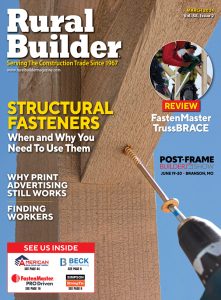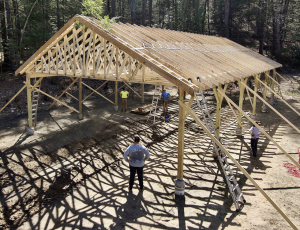Rural builders everywhere are tracking how the changing nature of the federal government affects the economic environment. And no wonder: Washington legislation can disrupt the most carefully crafted business plan and put downward pressure on profits.
Important as are national elections, however, the health of your construction business very often depends on decisions made at a lower level of the political food chain: Your local county and municipality.
“It’s all too easy to focus our attention on legislation and regulation by the federal government,” says Sean W. Hadley, a Moorestown, N.J.-based attorney active in government relations. “But the reality is that businesses are often more affected by local ordinances than by anything that goes through—or doesn’t go through—Congress and the federal agencies.”
All politics: Local
Local governments typically control a host of mission-critical “quality of business” issues. Among them are zoning, business licensing and expansion, roads and traffic patterns, parking, billboards, the design of storefronts and building exteriors, safety, and the environment. An unfriendly ordinance passed in any of those areas can throw a monkey wrench into a builder’s operations.
Builders clearly need to know the lay of the land before breaking ground. That goes double in regions where people tend to be very independent. “Rural property issues, especially in the Mountain West, are very different from other parts of the country,” says Hadley. “Rural landowners value freedom and autonomy, so builders must learn of any land use restrictions before investing capital.”
Given the realities of local politics, builders need to be informed about proposed regulatory changes early in the game. “When a story about a new regulation appears in your local press, it’s too late for you to make an impact,” says Fairfield, Conn.,-based attorney Cliff Ennico, author of Small Business Survival Guide (Adams Press). “A lot of debate occurs before votes are taken on a proposed measure, and you need to get your voice heard early in the decision cycle. If there’s a hearing in three weeks about a rezoning proposal that affects your operations, you want to be at that hearing.”
Stay alert
So how do you set up an early warning system? Existing resources can help. “Your town website may offer news feeds, e-newsletters, Facebook pages, or Twitter posts,” says Marc H. Pfeiffer, Assistant Director at the Bloustein Local Government Research Center, New Brunswick, N.J. (blousteinlocal.rutgers.edu/staff/). All such media are conduits for news about proposed regulations. “Also look for ‘hyperlocal’ websites where people write blogs or maintain online newspapers about local government affairs.”
Perhaps the best information source, though, is personal in nature. “Local elected officials know their communities firsthand and are in tune with local uses,” says Hadley. “Forming relationships with them will ensure that the builder has all relevant information before breaking ground.” That information can include advance notice of troublesome laws or regulations that might be coming down the road. “Local officials can alert builders to pending legislative or zoning issues that may affect property values, such as water rights, livestock, or farming.”
Get the ball rolling with a call to a local council person requesting an appointment to discuss topics of interest to the business community. That meeting may disclose the names of other local movers and shakers as prospective partners in constructive dialogs.
You can also invite your representatives to visit your place of business. “Let the politicians see what you do and how many people you employ and how much tax revenue you generate,” says Nancy Bocskor, a political consultant in Arlington, Va. (nancybocskor.com). “Make sure they understand the value you bring to your community.”
Whatever the venue, the most successful engagement will be a two-way dialog. Emphasize your potential to help the politician do a better job by making a statement such as this: “I have my finger on the pulse of small business. I can be a friendly resource for you. Call me whenever you have a question about the business impact of proposed legislation.”
Helping a politician do a better job promotes the kind of win-win relationship that goes a long way toward building your power base. “Politics is all about back scratching,” says Ennico. “Tell the politician how you will help him or her in exchange for support for your position on proposed legislation.” If the politician supports a bill you want passed, will you invite him or her to speak before your civic group on the topic? That can help garner more voters.
While you can employ the process described above for as many politicians as you like, your time is limited so you will need to be selective. “Find out who the powerful people are,” suggests Ennico. “In every community there are people who are effective in making things happen and people who are not. And the former might not be the people with the biggest offices. In one town, for example, it might be the head of the local Democratic party rather than the mayor.” Your informal talks with local politicians will reveal the names of these power players. Those are the ones you want to cultivate.
Create a dialog
Your first contact with a politician should aim to cultivate a lasting partnership. Avoid asking for a favor right away. “Keep in mind that you will require this person’s assistance over the long term,” says Hadley. “It’s never good to start a relationship with your needs at the forefront.”
When you do approach the politician with a request, do so as a spokesperson for the larger business community rather than for your own business. “Show the official how a certain proposed regulation will affect x, y and z,” suggests Bocskor. “And back up your story with data. People need to know the consequences of proposed government actions that often sound good before you do the math.”
Conversely, you may want to promote an entirely new business-friendly ordinance. Become an agent for positive change by providing numbers that show how the proposal will benefit the public at large rather than your operation’s shareholders. “Many communities welcome development,” says Hadley. “Builders may find local officials willing to revisit land use rules to spur economic activity.”
Speaking of numbers, few are as important as the ones in your town’s budget. You may not ordinarily give much thought to that arcane document, but it can have an outsized influence on your business. “Budget issues are really ones of priority,” says Hadley. “Suppose you need improvements to the roads in a certain area, and you were able to convince your town to pass an ordinance requiring that. You think you have accomplished your goal, but if the town budget does not allocate the requisite funds you will see no road improvements over the coming year. Without the money to fund it, an ordinance is only worth the paper it’s written on.”
Vital as it is, involvement with the town budget is a long game. “You have to start small, by getting to know your town officials,” says Hadley. “You can’t just walk into your town hall and say ‘I want to know everything about the budget and want to influence it.’ Your town officials will not be forthcoming. You have to get to know them first on a personal level as a small business owner.”
Team up for success
If the solitary business owner possesses political power, there’s no doubt that scheduling constraints can hamper the most well-intentioned effort. “Any kind of community work is a time vampire,” says Ennico. “We are so busy running our shops and working 24/7 that taking time out for civic involvement is a lot to ask. It’s easy to let things slide because you are too busy.”
Reach out to your fellow business owners for assistance. Expand your circle of acquaintances through involvement in the local chamber of commerce or business council. Others will be more willing to lend a hand when they see you have blazed a trail through the wilderness of local politics.
Working with others as a team will raise your profile in the community and promote greater acceptance of initiatives that support economic development. The alternative is to accept any unfavorable regulation the government throws your way. “If you don’t reach out, you will become invisible to local politicians,” says Ennico. “And when you become invisible, bad things can happen.” RB



















